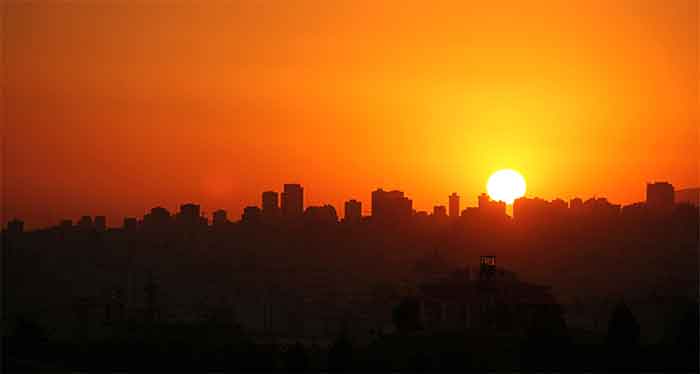
Covering Climate Now, CCNow, is a consortium of publications and journalists dedicated to better climate journalism; I’m a climate activist not a climate journalist but I subscribe to the CCNow newsletter as a good source of climate news as well as an insight to the world of climate journalism.
In the April 21st edition I found a link to ‘what we can do about it’, Climate journalism enters the solutions era, an article by Abby Rabinowitz in the Columbia Journalism Review (CJR) about coverage of climate solutions in American media. I thought: Is the author going to direct me to climate mitigation solutions that are outside of orthodox decarbonization?
Long story short: every citation – Washington Post, NYTimes, Bloomberg Green and several new podcasts – was overwhelmingly concerned with orthodox decarbonization; I could find no articles on supply-side conceptions of climate mitigation, on policies such as a regulated managed decline or fossil fuel non-proliferation treaties or even government regulation limiting new fossil infrastructure.
Climate is an emergency requiring a very rapid reduction in our production of greenhouse gases (GHGs). If we are to reduce emissions by half this decade we must stop just calling climate an emergency but actually start acting like it is. This would mean using all of the policies in the policy toolkit – not just the presently allowed policies. Deep decarbonization was always going to be a stretch and net zero by 2050 is a dangerous trap.
So why is so little attention given to the full palette of climate policies? Relying only upon orthodox decarbonization is like being in a life or death street fight with one hand tied behind your back and playing by Marquis de Queensbury rules.
Climate journalists aren’t the climate bad guys and the conclusion I’m going to describe below is that their failure to properly inform Americans about climate mitigation is symptomatic of how deeply Americans are in society-wide implicatory denial. Sociologist Kari Norgaard: implicatory denial: the climate science is not denied but instead “the psychological, political or moral implications that conventionally follow” from this science are denied.
I hope to provoke a little learning by maybe making denial visible. Here’s my email to Abby Rabinowitz for starters:
Hi Abby,
When I saw ‘what we can do about it’ in my CCNow newsletter this long time climate activist wondered ‘is she going to link to any climate writing about supply-side policies like a regulated managed decline, or nationalizing the fossil corporations and winding them down, or emergency mobilization or powering down? Instead of the allowed orthodox decarbonization where renewables out compete fossil fuels in the present market, aided by carbon pricing or subsidies in industrial policy’?
Now I don’t generally do podcasts but your WashPost, NYTimes and Bloomberg Green links are 100% strictly within orthodox decarbonization, nothing about actually regulating what is now a humanity threatening toxin and I’m expecting that the podcasts won’t inform about real climate solutions either.
What sort of indictment of climate journalism in the solutions era is this? No McGlade-Ekins, no fossil fuel non-proliferation treaties. No analysis of the different moral culpability of the dealer from the addict.
No insight into how neoliberalism blinkers the whole conception of climate mitigation into what’s only compatible with the present economic and political BAU – only allowing instruments and policies compatible with BAU. No heads up that governments protecting their citizens is limited by the sacred need to protect the laminate of investment into the future.
Doesn’t Michael Mann – leading climate scientist and stalwart climate leader – understand that 100% renewables is an illusion, a comforting denial of our predicament? That orthodox decarbonization by itself will not – can not – reduce emissions by the needed 50% plus by 2030?
Knowledgeable, responsible citizens faced with our existential climate predicament would demand a quick wind down of the production of the threatening toxin, but instead consumers want solutions that require just a tweak of our present very fortunate lifestyles.
Have you read sociologist Kari Norgaard on this new climate denial – implicatory denial? I happen to have a fortunate position in the boonies, not engaged in normal daily affairs, and it’s easy to see that new climate denial about orthodox decarbonization is society-wide and pervades climate journalism. And it’s as clear in policymakers: AOC and Markey, for example or, in my country, Trudeau’s pretend Pan-Canadian action plan.
If you are still reading, I’m not writing to give you a bad time; I’m hoping you might just realize that I’m trying to tell you about a very important criticism of not just climate journalism but of our whole conception of climate mitigation.
Now if you are interested checkout this page of quotes and the docs they link to, and I’m going to paste on a relevant section of one of my opeds leading up to the Biden climate summit. If you are interested in more, or in maybe writing it up proper, I’ve got language and links, and I’m all for learning and moving ahead,
Bill Gibsons, BC
In his new (very readable) online energy textbook, Energy and Human Ambitions on a Finite Planet, physicist Tom Murphy sagely cautions: “It may also be advisable to avoid characterizing the set of interconnected global challenges as ‘problems,’ because the word problem implies a solution. It implicitly isolates the issue at hand into a stand-alone simple issue, promoting ‘what-if-we-just’ proposed solutions. The real story is far more intricate, and more like a game of whack-a-mole. … A simple ‘fix’ to one corner of the problem makes something worse elsewhere. A better word is predicament, intoning a more serious and possibly intractable situation. … Predicaments don’t have solutions, but responses. … Problems can be faced head-on and be defeated, whereas predicaments call for stepping around and finding a different path.”
The esteemed climate journalist Elizabeth Kolbert has just written “a book about people trying to solve problems created by people trying to solve problems.” Under a White Sky reflects on “our habit of mind–that when we come up against one of these problems we try to come up with the technology to solve it. That is a profound thread in recent human history. How it plays out is perhaps the crucial question in the coming century.”
Perhaps we should instead be stepping around and finding a different path. We need governments—especially Biden’s American government—to lead in what is probably our last chance to escape climate catastrophe.
As investment expert Tariq Fancy explains in a blockbuster Globe and Mail op-ed: “As COVID-19 landed in Canada last year, we quickly learned the importance of having an effective government take charge when a systemic crisis hits. We couldn’t rely on the free market or the best efforts of individuals. We needed fast and sweeping government action to keep the pandemic from raging out of control and taking tens of thousands of additional lives. Unfortunately, the crisis was also a sharp reminder of what science and policy experts have told us for decades: that similar government action is desperately needed to avert the far more dangerous threat posed by climate change.”
https://www.hilltimes.com/2021/04/15/coming-to-grips-with-our-climate-predicament/293094
Now Ms. Rabinowitz did not reply. I don’t know if she even received my email. She didn’t have to reply and my email is long and rambling and maybe even confusing if you are in society-wide denial and nobody has even told you about supply-side policies or how neoliberalism constrains our very conception of climate mitigation. I re-sent my email with this header:
(Resending just once – no reply. No obligation of course but climate journalists mis-leading the public so completely is worrying (tragic? unacceptable?). Do they not know that there are differing mitigation conceptions and policies? If climate is an emergency – and it is because of three failed decades of orthodox decarbonization – shouldn’t we even consider using both arms of the scissors? If we consider the consequences of our actions today for innocent victims in other plces today and generations in the future? Isn’t this a climate story about climate journalism that needs telling?)
Again I got no reply and that is why I’m writing this oped. As well as informing you about this problem of denial affecting climate journalists, I intend to send a link to my oped to the editors of CCNow, the CJR and other parties that should be interested. I hope a journalist will then research and write it up proper.
My preliminary research found that the terms renewables, solar and wind, carbon pricing, ‘innovation’, etc, had zillions of mentions in US media during the past decade while ‘a managed decline of fossil fuels’ was only mentioned 36 times. (But increasing lately.)
To not even consider mitigation strategies and policies that could rapidly reduce our damage to the environment, reduce the danger to vulnerable innocents today, and generations in the future is unconscionable.
Futurist/activist Alex Steffen explains how we get a “fossil first’ climate action plan instead of a ‘climate first’ approach” this way in a recent post about how Biden’s climate action is not the beginning of a seachange but the last hurrah of an era of predatory delay:
“The debate may have shifted from outright denial of the crisis to calls for measured and responsible action, but strategy is still the same: stall. Our public discourse is beset with climate triangulation: approaches to a present and all-consuming crisis that first emphasize ambitious distant goals, then solicit modest initial steps, and then agrees to accepting those halting, insufficient actions as “in line” with ambitious transformation. Triangulation reframes delay as responsibility……
We have run on for a long time, living in (often willful) blindness, telling ourselves comforting stories of continuity and gentle transitions, but sooner or later the fierce realities of life on Earth were always going to catch us.”
As I said to Ms. Rabinowitz, I’m all for learning and moving ahead; hopefully to real, effective, climate mitigation.
Bill Henderson is a long time climate activist and Countercurrents contributor – bhenderson(at)dccnet(dot)com
GET COUNTERCURRENTS DAILY NEWSLETTER STRAIGHT TO YOUR INBOX












































